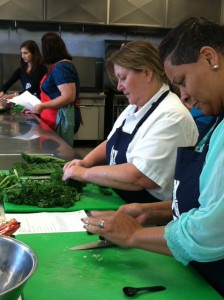Training the Trainers about New Jersey’s Fresh Produce
October 5, 2012 | Community News
 Passage of the USDA’s Healthy, Hunger-Free Kids Act of 2010 requires schools across New Jersey and the country to “get an education,” so to speak, when it comes to incorporating more fresh fruits and vegetables in school feeding programs – an idea which NJPHK whole-heartedly supports. To help schools meet the requirements and deadlines mandated by the new rule, the Partnership, along with Shaping NJ, sponsored an educational program called “Kitchen Essentials: Knife Skills and Healthy Recipes on October 5.” It was hosted by the NJ Farm to School Network for about 40 attendees at Hudson County Community College Culinary Arts Center in Jersey City. Many of the attendees came from schools in the five communities where the Partnership is active, and most were school food service directors.
Passage of the USDA’s Healthy, Hunger-Free Kids Act of 2010 requires schools across New Jersey and the country to “get an education,” so to speak, when it comes to incorporating more fresh fruits and vegetables in school feeding programs – an idea which NJPHK whole-heartedly supports. To help schools meet the requirements and deadlines mandated by the new rule, the Partnership, along with Shaping NJ, sponsored an educational program called “Kitchen Essentials: Knife Skills and Healthy Recipes on October 5.” It was hosted by the NJ Farm to School Network for about 40 attendees at Hudson County Community College Culinary Arts Center in Jersey City. Many of the attendees came from schools in the five communities where the Partnership is active, and most were school food service directors.
The course was taught by representatives from NuWay Concessionaires, the West New York Schools, and The Food Trust, which is the lead Mid-Atlantic agency for the National Farm to School Network.
“As a result of the Healthy, Hunger-Free Kids Act, schools are being asked to use more fresh fruits and vegetables in school meals, but many school kitchens don’t have staffs that know how to cook from scratch or the equipment necessary to wash, cut, prep and serve fresh produce,” said Beth Feehan, director of the NJ Farm to School Network. “We’re trying to bridge the labor force’s knowledge gaps, , and help schools increase their fruit and vegetable productions in school feeding programs.”
“Kitchen Essentials” program participants learned basic knife skills, food handling practices, and recipe development using fresh, local produce and commercial kitchen equipment. They also learned more about the region’s produce seasonality and availability and how these factors affect pricing, as well as how to turn produce into value-added recipes to save money.
 The New Jersey Farm to School Network, part of the National Farm to School Network, was founded in 2008 to provide a statewide resource for farm to school programs. They work with schools, farmers, advocates, food service professionals, state agencies, and organizations such as the NJPHK to improve school lunches and provide nutrition education through school garden programs. The New Jersey Farm to School Network provides New Jersey schools with ongoing coordination of farm to school activities that promote the health and wellbeing of students, farms and communities.
The New Jersey Farm to School Network, part of the National Farm to School Network, was founded in 2008 to provide a statewide resource for farm to school programs. They work with schools, farmers, advocates, food service professionals, state agencies, and organizations such as the NJPHK to improve school lunches and provide nutrition education through school garden programs. The New Jersey Farm to School Network provides New Jersey schools with ongoing coordination of farm to school activities that promote the health and wellbeing of students, farms and communities.
According to Feehan, Network programs aim to increase locally grown food in cafeterias by coordinating local food purchasing through existing produce distributors and farms, and provide an online directory of New Jersey farms willing to sell to K-12 schools. Their support for the state’s farmers includes coordination with the NJ Farm Bureau to produce a regional seasonality chart listing all of New Jersey’s fruits and vegetables, and organizing yearly statewide conferences and trainings to promote farm to school programs in K-12 schools.
SHARE:
Contact Us: 609-278-9622
Follow Us On: